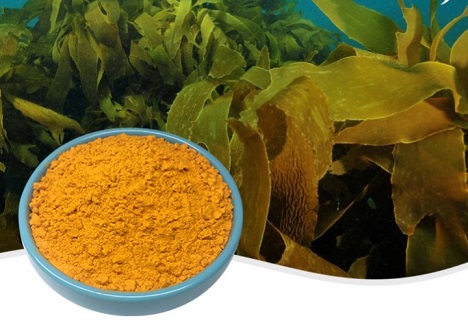Nikhil Prasad Fact checked by:Thailand Medical News Team Jun 15, 2024 1 year, 7 months, 2 weeks, 6 days, 36 minutes ago
Cancer News: Tongue cancer, a type of oral cancer, primarily affects adults aged 40 to 60. This disease is notably aggressive due to the tongue's rich blood supply and frequent movement, which can facilitate early spread to other parts of the body, including the lungs. Traditional treatments include surgery and chemotherapy, but these often lead to recurrence and poor patient outcomes. Researchers are constantly seeking more effective treatments with fewer side effects. This search has turned attention towards traditional Chinese medicine, known for its low toxicity and synergistic effects with modern drugs.
What is Fucoxanthin?
Fucoxanthin is a carotenoid found in various marine organisms, including algae and shellfish. It has gained attention for its numerous health benefits, including anti-inflammatory, anti-oxidative, and neuroprotective effects. Recent studies have highlighted its potential in cancer treatment, particularly its ability to inhibit tumor growth and promote cell death in cancer cells.
The Study: Fucoxanthin's Impact on Tongue Cancer Cells
A recent study by scientists from Hwamei College of Life and Health Sciences, Zhejiang Wanli University-China that is covered in this
Cancer News coverage, explored how fucoxanthin affects tongue cancer cells, specifically focusing on SCC-25 human tongue squamous carcinoma cells. Researchers used various concentrations of fucoxanthin and measured its effects on cell viability, reactive oxygen species (ROS) levels, and several key biomarkers related to cancer progression and cell death.
 Fucoxanthin: A Promising Natural Agent Against Tongue Cancer
Key Findings
-Reduced Cell Viability:
Fucoxanthin: A Promising Natural Agent Against Tongue Cancer
Key Findings
-Reduced Cell Viability: Fucoxanthin significantly decreased the viability of SCC-25 cancer cells in a dose-dependent manner. Higher concentrations of fucoxanthin led to a greater reduction in cancer cell survival, with minimal effects on normal cells.
-Increased ROS Levels: ROS are molecules that can damage cells and play a role in cell death. The study found that fucoxanthin treatment led to a significant increase in ROS levels within the cancer cells, indicating that fucoxanthin promotes oxidative stress, which can lead to cell death.
-Induction of Ferroptosis: Ferroptosis is a type of programmed cell death distinct from apoptosis (cell suicide). This process is driven by iron and lipid peroxidation. Fucoxanthin was found to induce ferroptosis in cancer cells, as evidenced by increased iron levels and lipid peroxidation markers.
Mechanisms of Action
The anti-cancer effects of fucoxanthin were linked to several molecular pathways:
-Nrf2/HO-1/GPX4 Pathway: This pathway is crucial for regulating oxidative stress and maintaining cellular health. Fucoxanthin downregulated the expression of Nrf2, HO-1, an
d GPX4, proteins that help protect cells from oxidative damage. By inhibiting this pathway, fucoxanthin promotes the accumulation of ROS, leading to cell death.
-p53 Pathway: The p53 protein is a well-known tumor suppressor that can trigger cell death. Fucoxanthin increased the expression of p53 in cancer cells, further promoting cell death through the ferroptosis mechanism.
-Iron Metabolism: Iron is essential for many cellular functions but can also contribute to cell death if not properly regulated. Fucoxanthin increased the levels of transferrin receptor 1 (TFR1), a protein that helps transport iron into cells, thereby promoting iron accumulation and ferroptosis.
Potential for Clinical Applications
These findings suggest that fucoxanthin has significant potential as a treatment for tongue cancer. Its ability to selectively target cancer cells while sparing normal cells makes it an attractive candidate for further research and development. However, more studies, including clinical trials, are needed to confirm its efficacy and safety in humans.
Conclusion
Fucoxanthin, a natural compound found in marine organisms, shows great promise in the fight against tongue cancer. By inducing oxidative stress and ferroptosis, it effectively kills cancer cells while having minimal effects on normal cells. These properties highlight fucoxanthin's potential as a novel therapeutic agent for cancer treatment, warranting further investigation into its clinical applications.
The study findings were published in the peer reviewed journal: Molecules.
https://www.mdpi.com/1420-3049/29/12/2832
For the latest
Cancer News, keep on logging to Thailand Medical News.
Read Also:
https://www.thailandmedical.news/news/breakthrough-in-anti-herpes-treatment-thailand-medical-researchers-at-chiang-mai-university-discover-potent-algae-extract
https://www.thailandmedical.news/news/herbs-and-phytochemicals-griffithsin-a-lectin-derived-from-the-red-algae-is-able-to-inhibit-influenza-a-and-sars-cov-2-viruses
